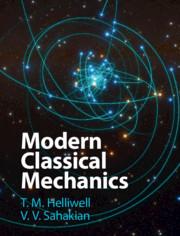Consider a Lagrangian (L^{prime}=L+d f / d t), where the Lagrangian is (L=) (Lleft(q_{k}, dot{q}_{k}, tight)), and
Question:
Consider a Lagrangian \(L^{\prime}=L+d f / d t\), where the Lagrangian is \(L=\) \(L\left(q_{k}, \dot{q}_{k}, tight)\), and the function \(f=f\left(q_{k}, tight)\).
(a) Show that \(L^{\prime}=L^{\prime}\left(q_{k}, \dot{q}_{k}, tight)\), so that it depends upon the proper variables. Show that this would not generally be true if \(f\) were allowed to depend upon the \(\dot{q}_{k}^{\prime} s\).
(b) Show that \(L^{\prime}\) obeys Lagrange's equations if \(L\) does, by substituting \(L^{\prime}\) into Lagrange's equations. Therefore the equations of motion are the same using \(L^{\prime}\) as using \(L\), so the Lagrangian of a particle is not unique. (This problem requires care in taking total and partial derivatives!)
Fantastic news! We've Found the answer you've been seeking!
Step by Step Answer:
Related Book For 

Question Posted:





